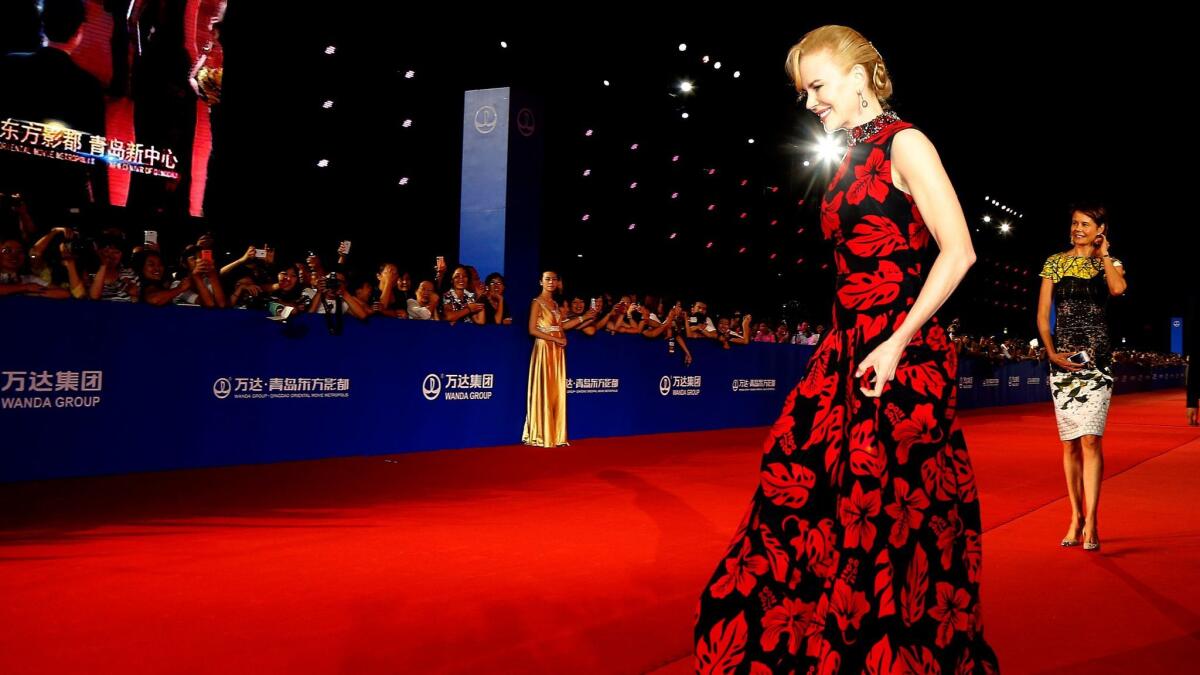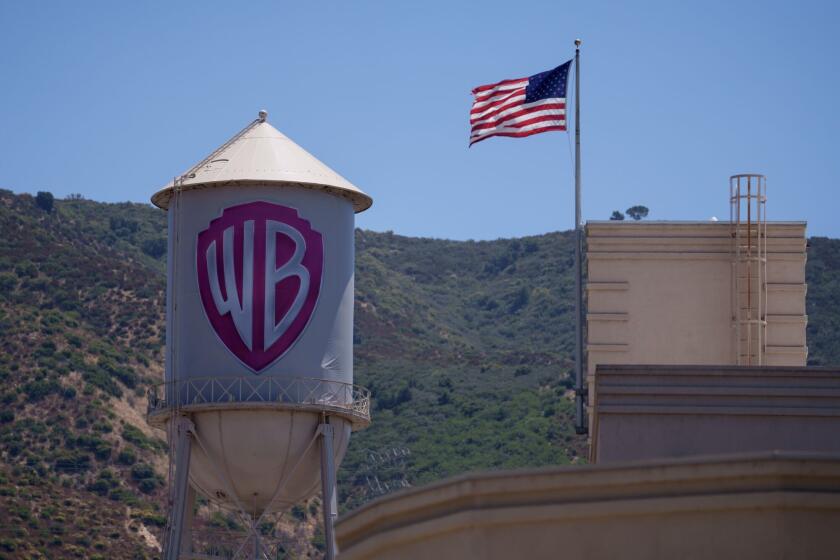Wanda sell-off of massive Chinese movie studio is latest retreat from Hollywood

- Share via
In 2013, Chinese billionaire Wang Jianlin unveiled plans for a moviemaking metropolis in the coastal city of Qingdao, with state-of-the-art film and TV soundstages and a massive water tank to draw big Hollywood productions.
Celebrities such as Leonardo DiCaprio and Nicole Kidman flew out to witness the unveiling of what was supposed to be the centerpiece of Wang’s efforts to make China a film business destination.
Less than four years later, Wang, the chairman of real estate conglomerate-turned-media-giant Dalian Wanda Group, is in retreat.
The brash business tycoon is reportedly unloading the studio business, part of his planned $7.3-billion Qingdao Movie Metropolis complex, in one of the most striking setbacks to date in his quest to become a global media mogul.
The move, previously reported by Chinese media and then detailed Thursday by the Wall Street Journal, is part of a broader sale of Wanda Group’s assets aimed at reducing debt. Wanda said this month it would sell $9.3 billion in tourism projects and hotels to real estate rival Sunac China. Under terms of the deal with Sunac, Wanda will retain a 9% stake in the studio business. It is also expected to maintain a management role, according to a person familiar with the matter who was not authorized to comment.
“Clearly this indicates Wang is lowering his expectations and goals for the entertainment business,” said John Burke, head of the entertainment group at law firm Akin Gump Strauss Hauer & Feld. “People were looking at Wanda like they were the real deal. There’s a lot of tire kickers over here from China, but Wang clearly seemed to be a guy who could write checks and do the deal. Now people are scratching their heads.”
Wanda declined to comment.
However, in a recent interview with Chinese news service Caixin, Wang said the sale of assets to Sunac and another real estate company, R&F Properties, was in response to the Chinese government’s call to reduce leverage.
“Wanda sold what should be sold and maintained what should be saved,” Wang said. “The tourism assets that were sold always have slow investment return and greater capital pressure.”
Wanda’s sudden retreat comes as China’s communist leaders have moved to rein in some of the country’s biggest private companies. The government believes Wanda and other firms have borrowed too much and invested blindly overseas — overpaying for assets that have little strategic value to the country.
A surge in lending since the 2008 financial crisis has put the already slowing Chinese economy on uneven ground. Outstanding debt grew to about 260% of GDP at the end of last year, up from 160% in 2008, according to Bloomberg Intelligence.
Political scientists say closer scrutiny of Wanda’s finances are warranted, but they also suspect Wang and other tycoons are being chastened for their bravado. President Xi Jinping is China’s first strongman leader in decades and he’s been consolidating his power in the lead up to the 19th party congress later this year.
The Qingdao studio project, in particular, appeared to be struggling despite the fanfare with which it was announced. Wang came to Los Angeles last year offering a 40% subsidy to lure Hollywood films to Qingdao. Plans for Wanda Studios, scheduled to fully open next year, featured 30 soundstages, including the world’s largest at 2.5 acres, and a heated underwater stage.
But among the U.S. studios there were few, if any, takers for the Qingdao project. The lone American studio to film at the Qingdao facilities was Legendary Entertainment, which Wanda owns. Wanda has also struggled to attract many local productions, and construction is not yet complete, according to people familiar with the matter who were not authorized to comment.
The project is said to have been hobbled by leadership turnover and ambitions that exceeded the company’s grasp. Plans to create an annual film festival at the site, for example, never got off the ground.
For months, there have been signs that Wanda would have to scale back its Hollywood takeover in the face of government scrutiny and scrapped deals.
It’s a stark contrast from the last couple years when Wang boldly declared he wanted to pour billions into the studio system and even buy one of the majors, such as Paramount Pictures. He also pledged to beat Walt Disney Co.’s theme park business in China, a promise that proved faulty.
Wanda began its Hollywood buying binge in 2012, with the purchase of AMC Theatres for $2.6 billion, which then rolled up other circuits, including U.S. rival Carmike Cinemas and major European chains.
But other efforts, especially on the content side of the business, haven’t been so easy. The company this year had to scrap a $1-billion purchase of Dick Clark Productions, which produces the Golden Globe Awards. Previously, Viacom Inc.’s controlling shareholders scuttled a plan to sell 49% of Paramount Pictures to Wanda.
Wanda last year said it paid an eye-popping $3.5 billion for Legendary Pictures, though Legendary executives now say the real figure was about $1.9 billion plus the assumption of debt. Legendary has produced a string of flops, including “The Great Wall,” the biggest-ever Chinese co-production, and “Warcraft.” (The Warner Bros. film “Kong: Skull Island,” however, turned a profit.)
Legendary still has not replaced Chief Executive Thomas Tull, who left in January. Wanda Cultural Industry leader Jack Gao has been serving as interim CEO, raising questions about the leadership of the storied film producer involved in such movies as “The Dark Knight” and “Jurassic World.”
Wanda had wanted to merge Legendary into its publicly traded film business, but market conditions combined with Legendary’s financial losses made that impossible. Still, Legendary maintains it is well capitalized and is confident in its upcoming movies.
“Legendary is well capitalized with liquidity to fund its film and TV slates and operate its business as usual,” the company said recently, after reports said the government was starting to take a hard line on deal-making by Wanda.
Publicly traded AMC Theatres sought to calm investors’ nerves this month, saying its acquisitions were not funded by Wanda. AMC made the comments after its stock fell 10% in one day on Wall Street. AMC recently bought U.S. rival Carmike Cinemas, Britain’s Odeon & UCI Cinemas, and Stockholm-based Nordic Cinema Group, and all of those deals have closed.
UPDATES:
5:35 p.m.: This article was updated to say that Wanda declined to comment. It was also updated to say that Wanda is expected to maintain a management role in the Qingdao studio.
This article was originally published at 4:05 p.m.
More to Read
Inside the business of entertainment
The Wide Shot brings you news, analysis and insights on everything from streaming wars to production — and what it all means for the future.
You may occasionally receive promotional content from the Los Angeles Times.












